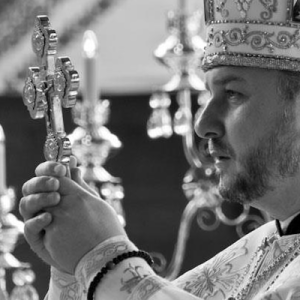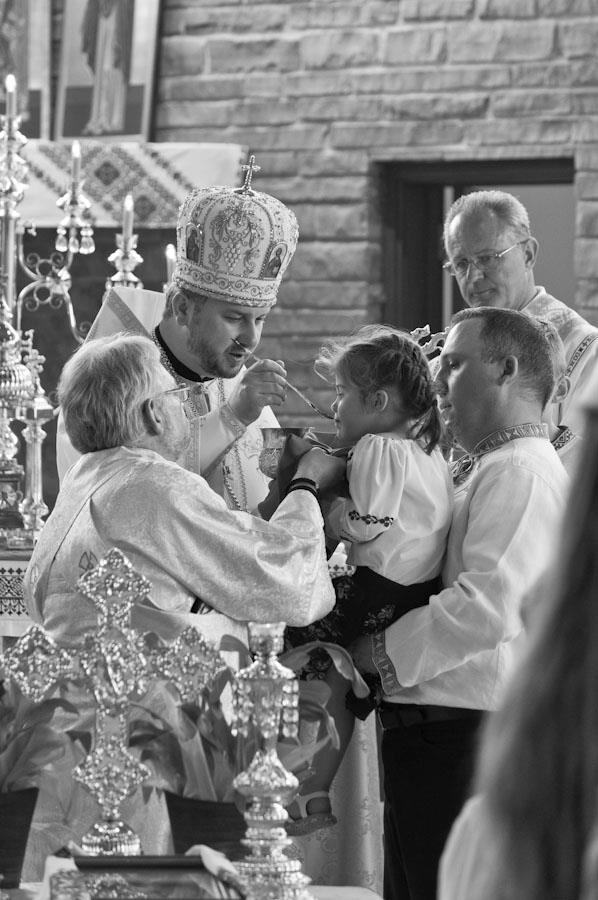
LXXXVIІ • Ч.9 вересень 2010 • September 2010 No.9 • LXXXVII
Religious formation begins in the family
— His Grace, Bishop ANDRIY
We are all troubled by the problem of the formation of youth, and are especially concerned with religious formation, yet we see how this is generally neglected.
God the Creator has made the family the foundation of human life. He has delineated certain responsibilities for the family, the basis of which consists of care. Natural instinct directs parents to care for their children, to raise them to adulthood so that they would be able to continue their life on earth independently.
Man is the highest and most perfect creation of God. The basis of the formation of a person is the knowledge of our God and Creator, and the consciousness of the goal of human life on earth—the salvation of our souls and acquisition of eternal happiness. Towards this end religious formation consists of coming to know and cultivating a world-view based upon the Law of God. This is the formation and development of the will and character of the Christian person.
Christian formation begins from the earliest days of a child. When the child becomes observant it begins to learn. It learns that which it sees and hears. Educators confirm that a person learns most during their first ten years of life. This is the time during which a child’s senses are formed. The child learns to distinguish between good and evil, and this means that it begins to learn about religion. Understanding and the acquisition of all the Christian virtues begins precisely at this age.
Parents are the best example to follow for a child. The child fully depends upon its mother for care and protection from all dangers. It unconditionally believes in its parents, and so the religious convictions and the example of the religious life of the father and mother are irrevocably passed on to the child. Faith in God and respect towards the Church are received by the child as it is able to understand given its child-like naivete and simplicity. The moral and spiritual values which are manifested in the daily life of the parents, in their interactions between themselves and those around them are transferred into the world-view and character of the child. The respect and honesty of the family surroundings at home is the cradle of the Christian character of the child.
The atmosphere pervading the home has a marked influence on the religious formation of the child. The first acquaintanceship with God is tied up with icons and the Cross, holy water, oil lamps and prayer. Through them a feeling of respect towards God and worship of Him is cultivated.
Contemporary homes where icons are not venerated, or where they aren’t even present, obviously cannot exert an influence on the formation of a Christian world-view, not to mention various parties or gatherings where adults are incontinent in their conduct and their words. Even though children are young, and seem to understand nothing, everything which they hear and see powerfully affects their formation.
Another important factor in the religious upbringing of children in the home is the participation of the parents in the life of the Church. When the parents are faithful, participating in the Liturgy every Sunday, they at the beginning bring, and later accompany with them their children to Church. Children from infancy grow in the life of the Church. In our Church we commune children from the moment of their baptism, and this gives the child a feeling of belonging to the Church. When the parents only infrequently attend Church how can they raise religious children and cultivate love for the Church in them? And so, when we observe young people who are alienated from the Church this shows that they have not had a good example to follow.
We must also be conscious of the fact that a person’s surroundings have a definite influence on the formation and development of personality, especially during childhood and adolescence. Contemporary teachers have various world-views and they influence youth in various ways. In any case, when the foundation of a firm religious world-view has been laid in the family children, having made their youthful mistakes, become the persons they were raised to be in the Christian home. Children with a Christian world-view will be with their parents and the Church, and children who have not received an adequate formation in the family will wander long and far. May God grant them to find the “way, the truth and the life”!

Parents and children’s Confession
Usually parents who regularly attend Church know well that children are confessed from 7 years of age, and those younger are communed without confession. But it’s possible that not all understand that children 2-3 years of age should be brought to the priest for a blessing before communion. Let us not neglect this — the child’s soul gracefully gathers everything which is found in the temple — icons, chant, candles, bells; the child remembers the priest, and his hand which blesses. Let us remember that when children were brought to Christ he said nothing to them, he just put his hand on their head and blessed them, appealing in this way not to their still undeveloped intellect, but to their hearts.
In general a child should be brought to Church often, and should be there as long as they are able. At home it is good to light candles and pray before the icons with them. All of this, after years of participation, is deeply fixed in the child’s soul and is kept their throughout their life. It is good for a young child to receive communion often—this is their joining together with God.
At 4-5 years of age, while the child does not confess sacramentally, if it understands that it has done something wrong it is good for them to admit their offense before those whom they offended, and very beneficial to bring the child to the priest, so that he can talk with them, offering guidance and where necessary advice. This helps greatly with the child’s spiritual development.
At 7 years of age the child is obliged to confess sacramentally. This is a very important time in their spiritual development, and a great responsibility for the parents. The parents themselves must create in the family a special atmosphere regarding Holy Communion. The day we commune must be joyful and solemn for the child — it should feel like a name’s day (or birthday). If the child manifests a desire not to commune try to determine the reason for this peacefully and seriously: the reasons might be sufficiently deep that it might require a pure, heartfelt confession by the parents or the whole family.
A child should fast according to their abilities. For example, before communion a child might refrain from watching television or playing computer games for 2-3 days.
For adolescents who lead an attentive spiritual life it is important to find a regular spiritual father/confessor who knows the family, who is trusted by the child, and who can direct the spiritual life of the child with great benefit. It is important that in addition to confession, communion, and participation in Saturday or Sunday school there be a proper atmosphere in the family.
Parents should not forget about the spiritual education of their son or daughter at home: it would be good to arrange the reading of one or another spiritual book, pray together (if even only at night) and even, if possible, to read together an akathist or sing certain liturgical songs.
It is important to create a pious atmosphere in the home: mutual attention, virtue, order, prayerfulness. Many teenagers like to keep a diary, and if your child has such a desire advise them to make it a spiritual diary (writing their impressions from books they have read, interesting thoughts they have heard in sermons, recommendations of their spiritual father, their own thoughts, etc.). This will bring great benefit to the child, especially because their confession will become for them fuller and deeper.
